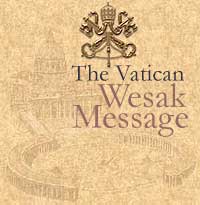Vatican stresses environmental concerns in annual message to Buddhists
Catholic Culture, May 17, 2010
The Vatican -- In an annual message to the world's Buddhists, the Vatican has emphasized the prospects for cooperation in work to protect the environment.
 Cardinal Jean Louis Tauran, the president of the Pontifical Council for Inter-Religious Dialouge, signed the annual message, which is timed for the Buddhist celebration of Vesakh, the festival of light. In the message he speaks of the need to safeguard the earth's resources and "protect mankind from self-destruction."
Cardinal Jean Louis Tauran, the president of the Pontifical Council for Inter-Religious Dialouge, signed the annual message, which is timed for the Buddhist celebration of Vesakh, the festival of light. In the message he speaks of the need to safeguard the earth's resources and "protect mankind from self-destruction."
"Our responsibility to protect nature springs, in fact, from our respect for one another; it comes from the law inscribed in the hearts of all men and women," the Vatican statement says. It goes on to stress "our shared convictions about the inviolability of human life at every stage and in every condition, the dignity of the person and the unique mission of the family, where one learns to love one’s neighbor and to respect nature."
The Vatican's full Vesak message:
Christians and Buddhists Together for Well Being of World
(17 May 10 – RV) The feast of Vesakh, the most important for Buddhists, is celebrated May 21st in countries that follow the Therevada tradition(Thailand, Sri Lanka, Cambodia, Biramnia, Malaysia, etc.) it was celebrated in Japan on March 8.The feast marks the principal events of the life of Buddha. Here is the text of the message from Cardinal Jean Louis Tauran, President of the Pontifical Council for Interreligious Dialogue.
Dear Buddhist friends,
1. On the occasion of your feast of Vesakh, the Pontifical Council for Interreligious Dialogue extends congratulations and heartfelt best wishes for peace and joy to all of you around the world. May this message help strengthen our existing bonds of friendship and collaboration in service to humanity.
2. Let us take this opportunity to reflect together on a theme of particular relevance today, namely, the environmental crisis that has already caused notable hardship and suffering throughout the world. The efforts of both of our communities to engage in interreligious dialogue have brought about a new awareness of the social and spiritual importance of our respective religious traditions in this area. We recognize that we hold in common a regard for values like respect for the nature of all things, contemplation, humility, simplicity, compassion, and generosity. These values contribute to a life of nonviolence, equilibrium, and contentment with sufficiency.
3. Pope Benedict XVI, has noted that “the various phenomena of environmental degradation and natural disasters… remind us of the urgent need to respect nature as we should, and to recover and value a correct relationship with the environment in everyday life” (General Audience, 26 August 2009). The Catholic Church considers the protection of the environment as intimately linked to the theme of integral human development; and for her part, she is committed not only to promoting the protection of land, water and air as gifts destined for everyone, but also to encouraging others to join the efforts to protect mankind from self-destruction. Our responsibility to protect nature springs, in fact, from our respect for one another; it comes from the law inscribed in the hearts of all men and women. Consequently, when human ecology is respected within society, environmental ecology also benefits (cf. Encyclical, Caritas in Veritate, n. 51).
4. Both Christians and Buddhists have a profound respect for human life. It is crucial therefore that we encourage efforts to create a sense of ecological responsibility, while at the same time reaffirming our shared convictions about the inviolability of human life at every stage and in every condition, the dignity of the person and the unique mission of the family, where one learns to love one’s neighbour and to respect nature.
5. May we together promote a healthy relationship between human beings and the environment. By enhancing our efforts to promote ecological consciousness for serenity and peaceful coexistence, we can give witness to a respectful way of life that finds meaning not in having more, but in being more. By sharing the insights and commitments of our respective religious traditions, we can contribute to the well- being of our world.
Dear Buddhist friends, once again allow us to express our sincere greetings and to wish all of you a Happy Feast of Vesakh.

 Cardinal Jean Louis Tauran, the president of the Pontifical Council for Inter-Religious Dialouge, signed the annual message, which is timed for the Buddhist celebration of Vesakh, the festival of light. In the message he speaks of the need to safeguard the earth's resources and "protect mankind from self-destruction."
Cardinal Jean Louis Tauran, the president of the Pontifical Council for Inter-Religious Dialouge, signed the annual message, which is timed for the Buddhist celebration of Vesakh, the festival of light. In the message he speaks of the need to safeguard the earth's resources and "protect mankind from self-destruction."